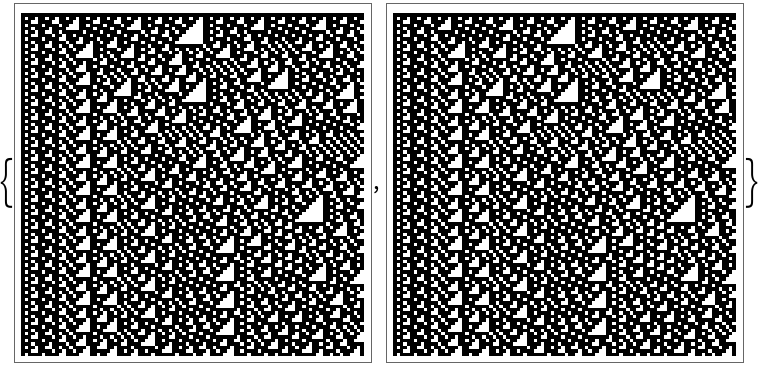Wolfram Function Repository
Instant-use add-on functions for the Wolfram Language
Function Repository Resource:
Iteratively apply a transducer finite automaton
ResourceFunction["IteratedFiniteAutomaton"][rule,init,t] generates a list representing the evolution of the iterated finite automaton with the specified rule from initial condition init for t steps. | |
ResourceFunction["IteratedFiniteAutomaton"][rule,s0,init,t] starts the iterated finite automaton with state s0. | |
ResourceFunction["IteratedFiniteAutomaton"][rule,init] gives the result of evolving init for one step. | |
ResourceFunction["IteratedFiniteAutomaton"][rule,s0] is an operator form of IteratedFiniteAutomaton that represents one step of evolution. |
Apply a simple iterated finite automaton to a single list:
| In[1]:= | |
| Out[1]= | |
Iterate the same rule for 100 steps:
| In[2]:= | ![ArrayPlot[ ResourceFunction[ "IteratedFiniteAutomaton"][{{1, 1} -> {1, 0}, {1, 0} -> {2, 1}, {2, 1} -> {2, 1}, {2, 0} -> {1, 0}}, ConstantArray[0, 100], 100]]](https://www.wolframcloud.com/obj/resourcesystem/images/261/26113c6a-1589-48c3-aaf9-588ab37bf631/119eb017f98b507d.png) |
| Out[2]= |  |
Evolve an iterated finite automaton specified as a code for 2 steps:
| In[3]:= | |
| Out[3]= | |
Evolve an iterated finite automaton specified as replacement rules for 2 steps:
| In[4]:= | |
| Out[4]= | |
Give the result of one step of evolving an iterated finite automaton:
| In[5]:= | |
| Out[5]= | |
| In[6]:= | |
| Out[6]= | |
The operator form equivalent:
| In[7]:= | |
| Out[7]= | |
| In[8]:= | |
| Out[8]= | |
Two different ways to specify the same iterated finite automaton:
| In[9]:= | ![{ArrayPlot[ ResourceFunction["IteratedFiniteAutomaton"][{28126, {3, 2}}, ConstantArray[0, 100], 100]], ArrayPlot[ ResourceFunction[ "IteratedFiniteAutomaton"][{{1, 1} -> {2, 1}, {1, 0} -> {2, 1}, {2, 1} -> {3, 0}, {2, 0} -> {1, 1}, {3, 1} -> {1, 1}, {3, 0} -> {3, 0}}, ConstantArray[0, 100], 100]]}](https://www.wolframcloud.com/obj/resourcesystem/images/261/26113c6a-1589-48c3-aaf9-588ab37bf631/2461498dfd0cb07a.png) |
| Out[9]= |  |
Rostislav Grigorchuk's automaton:
| In[10]:= | |
| Out[10]= |  |
Generate a Sierpiński gasket-like structure:
| In[11]:= | |
| Out[11]= |  |
This work is licensed under a Creative Commons Attribution 4.0 International License